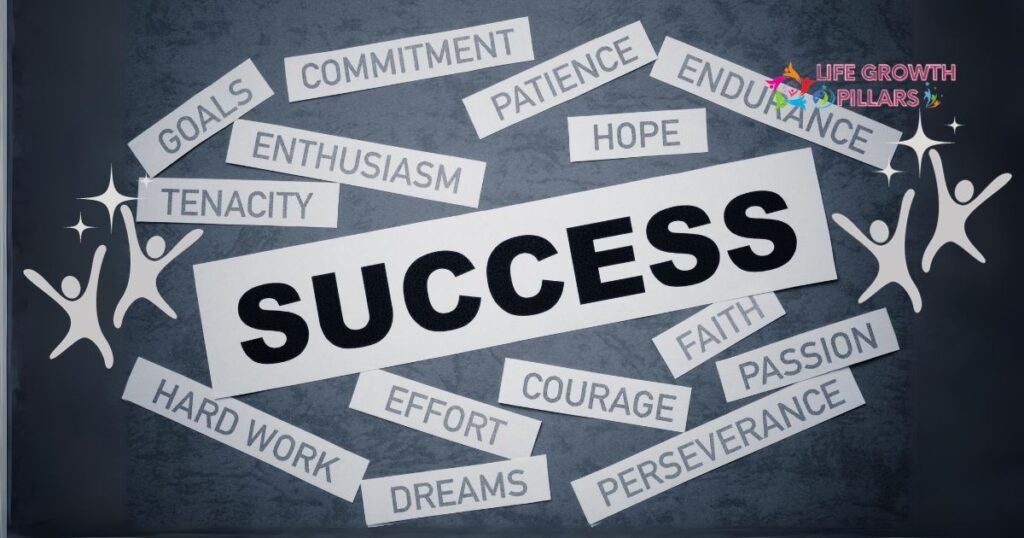Success In Life | Achieving Your Goals And Dreams
Success in life is a term that means different things to different people. For some, success may be measured by financial wealth or career accomplishments, while for others it may be determined by personal happiness and fulfillment. Success in life, achieving your goals and dreams article give us valuable insights for achieving success in life. Regardless of how one defines success, the path to achieving it is not always clear or easy. In this article, we will explore some key strategies for achieving success in life, including setting goals, developing a positive mindset, and building strong relationships.

How To Achieve Success In Life
Striving for success is a timeless pursuit that resonates with individuals across the globe. Achieving success isn’t a mere stroke of luck; it’s a culmination of dedicated efforts, perseverance, and a strategic approach to life. Here, we delve into actionable steps and mindsets that pave the way for a fulfilling and successful life.
Creating A Vision Board
The first step towards achieving success in life is a vision board. Vision board is a visual representation of your goals and dreams. It can be a poster board, a digital board or even a notebook. It is a powerful tool to help you visualize and manifest your goals. By creating a vision board and placing it in a place where you can see it every day, you are constantly reminded of your goals and the actions you need to take to achieve them.
Setting Goals
Another aspect for achieving success is to set clear, measurable, and achievable goals. Goals give direction and purpose to our lives, and help us stay focused and motivated. When setting goals, it is important to be specific about what you want to achieve, and to set deadlines for when you want to achieve them. Additionally, it is important to break down larger goals into smaller, more manageable tasks that can be completed on a daily or weekly basis.
Hard Work And Perseverance
Another key principle for achieving success in life is hard work and perseverance. Successful people understand that achieving their goals requires dedication and effort. They are willing to put in the time and energy necessary to reach their goals, even when faced with obstacles and setbacks. This means that they are willing to take risks and make sacrifices in order to achieve success. It also means they are resilient and maintain a positive attitude towards failures and challenges.
Developing A Positive Mindset
A key strategy for achieving success in life is to develop a positive mindset. A positive mindset is characterized by a belief in one’s abilities, a willingness to take risks, and a focus on the present moment rather than dwelling on the past or worrying about the future. To develop a positive mindset, it is important to practice gratitude, set realistic expectations, and surround yourself with positive people and influences.
Developing Good Habits And Routines
Another important principle for achieving success in life is developing good habits and routines. Successful people understand that small, consistent actions lead to big results over time. They make a habit of setting aside time each day to work towards their goals, whether it be reading, exercising, or learning a new skill. They also make a habit of reviewing their progress and making adjustments as necessary. By developing good habits and routines, individuals can stay on track and make consistent progress towards their goals.
Self-Discipline
Self-discipline is also an essential element for success in life. It is the ability to control one’s emotions, impulses, and desires in order to achieve a goal. Self-discipline allows individuals to stay focused and motivated, even when faced with temptations or distractions. It helps them to make the right decisions, even when it is difficult, and to stick to their goals.
Self-discipline is a skill that can be developed with consistent practice and effort. It can be challenging to maintain self-discipline, especially when faced with external pressures or unexpected obstacles. However, there are several strategies that can help individuals develop and strengthen their self-discipline, including:
Setting Clear And Specific Goals
Having a clear understanding of what you want to achieve will help you stay focused and motivated.
Creating A Routine
Establishing a consistent routine can help you develop good habits and avoid distractions.
Practicing Mindfulness
Holding Yourself Accountable
Being accountable to yourself and others can help you stay on track and avoid procrastination.
Remember, self-discipline is not about being perfect or denying yourself pleasure. It’s about making conscious choices that align with your goals and values, even in the face of temptation or adversity. With patience, persistence, and self-compassion, anyone can develop the self-discipline needed to achieve success in life.

Good Attitude
Having a good attitude is crucial for success in life. A positive attitude can help to overcome obstacles, stay motivated, and keep a clear mind. It helps to keep individuals optimistic and to look for opportunities in difficult situations. People with a positive attitude tend to be more resilient and better able to cope with stress and setbacks. They tend to be more confident and self-assured, which can help them to achieve their goals.
Learning From Failure
Learning from failure is an important aspect of achieving success in life. Failure is not only inevitable, but it is also an important learning opportunity. Every time you fail, you have the opportunity to learn and grow, and to use that knowledge to improve and achieve your goals.
Building Strong Relationships
Another key strategy for achieving success in life is to build strong relationships with family, friends, and colleagues. Strong relationships provide support, encouragement, and inspiration, and help us to navigate the challenges and obstacles we encounter on our journey to success. To build strong relationships, it is important to be open, honest, and genuine, and to take the time to listen and understand the perspectives and needs of others.
Keep Learning
One of the most important principles for achieving success in life is to always keep learning. Successful people understand that learning is a lifelong process and that they must continually update their knowledge and skills in order to stay competitive and achieve their goals. They make a habit of reading, attending workshops and training, and seeking out mentors. They are always looking for new opportunities to learn and grow.
Staying Focused
Staying focused is essential for achieving success in life. It is easy to get distracted by the many demands and distractions of everyday life, but it’s important to remember that staying focused on your goals is crucial for achieving them. To stay focused, it’s important to set aside dedicated time to work on your life goals, and to eliminate distractions as much as possible.
Conclusion
Achieving success in life is a process that takes time, effort, and determination. By setting clear goals, creating a vision board, taking action, developing a positive mindset, creating a support system, learning from failure, and staying focused, you can increase your chances of achieving success in life. Remember that success means different things to different people, so focus on what is most important to you and strive to achieve it with passion and purpose.

Frequently Asked Questions
Q1. What does success in life mean?
A. Success in life is a subjective concept that varies from person to person. It’s not solely measured by material wealth or accomplishments but often includes personal fulfillment, happiness, achieving personal goals, contributing to society, maintaining healthy relationships, and experiencing overall satisfaction in various aspects of life.
Q2. How can one define their personal success in life?
A. Defining personal success involves introspection and understanding what truly matters to an individual. It requires identifying aspirations, values, and long-term objectives across different areas such as career, relationships, health, personal growth, and community involvement. It’s about setting meaningful goals that align with one’s values and passions.
Q3. What are some key habits or traits of successful individuals?
A. Successful individuals often share common habits and traits, such as resilience, determination, discipline, continuous learning, effective time management, adaptability, goal-setting, and maintaining a positive mindset. Additionally, the ability to embrace failure as a learning experience and persist despite challenges is crucial.
Q4. How can setbacks or failures contribute to success in life?
A. Setbacks and failures are integral parts of the journey toward success. They provide valuable lessons, resilience, and opportunities for growth. Overcoming failures often leads to gaining wisdom, resilience, and a deeper understanding of oneself, ultimately contributing to a more fulfilling and successful life.
Q5. How does goal-setting contribute to achieving success in life?
A. Goal-setting is a fundamental aspect of achieving success in life. Clear and specific goals provide direction and motivation, helping individuals stay focused and organized. By setting SMART (Specific, Measurable, Achievable, Relevant, Time-bound) goals and consistently working towards them, individuals can progress steadily toward their desired outcomes.
Q6. How can a positive mindset contribute to achieving success in life?
A. Maintaining a positive mindset plays a pivotal role in achieving success. It helps individuals navigate challenges, stay resilient, and maintain focus on goals. Positivity fosters creativity, problem-solving skills, and enhances overall well-being, enabling individuals to overcome obstacles with a proactive and optimistic approach.
Q7. What role does continuous learning and personal development play in achieving success?
A. Continuous learning and personal development are cornerstones of success. They empower individuals to adapt to evolving situations, acquire new skills, and broaden perspectives. Embracing lifelong learning enhances creativity, boosts confidence, and increases adaptability, all of which are crucial for achieving success in various aspects of life.
Final Thoughts
In the pursuit of success in life, it’s vital to recognize that the journey is as significant as the destination. Success is not solely about reaching the end goal but also about the personal growth, learning, and experiences gained along the way. Embrace failures as opportunities, set meaningful goals aligned with your values, cultivate positive habits, and remain resilient in the face of challenges. Remember, success is a holistic concept encompassing various aspects of life, and finding balance while striving towards your aspirations is key to achieving a fulfilling and successful life.


